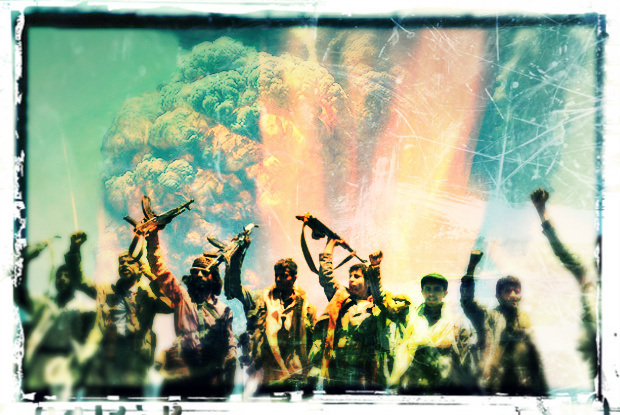21st Century Wire says…
According to the Stockholm International Peace Research Institute (SIPRI), arms imports to Middle Eastern countries have had an 86 percent upsurge over the past decade. In addition, US arms exports have amounted to nearly one third of global arms imports from 2012-16.

‘SAUDI STRIKES’ – Saudi Arabia has repeatedly violated human rights during their ongoing military intervention in Yemen since 2015. (Photo Illustration 21WIRE’s Shawn Helton)
Stockholm’s Arms Report
SIPRI is a Swedish based think-tank focused on independent research concerning “conflict, armaments, arms control and disarmament. Established in 1966, SIPRI provides data, analysis and recommendations, based on open sources, to policymakers, researchers, media and the interested public.”
The recently released Stockholm study yielded some stunning conclusions concerning arms exports from the US and Europe, in addition to arms imports acquired by Gulf Cooperation Council (GCC) countries, most notably Saudi Arabia. According to this latest report from 2012-16, there has been the highest arms transfer volume over a 5-year stretch since the end of the Cold War. Here’s a passage from the SPIRI armament findings that have dovetailed the ongoing Western-backed regime change campaign in Syria as well as Yemen:
“Saudi Arabia was the world’s second largest arms importer in 2012-16, with an increase of 212 per cent compared with 2007–11. Arms imports by Qatar went up by 245 per cent. Although at lower rates, the majority of other states in the region also increased arms imports. ‘Over the past five years, most states in the Middle East have turned primarily to the USA and Europe in their accelerated pursuit of advanced military capabilities’, said Pieter Wezeman, Senior Researcher with the SIPRI Arms and Military Expenditure Programme. ‘Despite low oil prices, countries in the region continued to order more weapons in 2016, perceiving them as crucial tools for dealing with conflicts and regional tensions.’”
Continuing, the wartime study revealed the extensive arms supplies exported by the US in recent years:
‘The USA supplies major arms to at least 100 countries around the world—significantly more than any other supplier state’, said Dr Aude Fleurant, Director of the SIPRI Arms and Military Expenditure Programme. ‘Both advanced strike aircraft with cruise missiles and other precision-guided munitions and the latest generation air and missile defence systems account for a significant share of US arms exports.’
Saudi Siege in Yemen
In 2015, a US-backed coalition led by Saudi Arabia and other GCC countries, directed airstrikes inside Yemen, continuing their breach of international law after announcing a ceasefire and the apparent end of Operation Decisive Storm. The Pentagon sanctioned Decisive Storm, gave way to the Orwellian-sounding, ‘Operation Restoring Hope’, even as the UN raised concerns over civilians killed throughout the consecutive Saudi Arabian airstrike campaigns in the region.
In October of 2016, Time magazine confirmed the growing wartime alliance between the US and its Saudi partners as the intervention in Yemen escalated. It was then revealed that Saudi Arabia,“…purchased more than $20 billion in arms from the U.S. in 2015 alone.”
While Western allies claimed that the Saudi-led airstrikes on Yemen were meant to ‘restore’ order – there was no explanation as to how the unprovoked bombardment would help bring stability to an already fractured region.
Almost a month after the Saudi-led airstrikes in Yemen began, the LA Times published a piece entitled, “Al Qaeda in Yemen using chaos of war to carve out terrorism haven.” The mainstream outlet outlined the rise of Al Qaeda militants in Yemen, also known as Al Qaeda in the Arabian Peninsula (AQAP) following the dubious air raids conducted by Saudi Arabia.
The AQAP narrative was preempted by a Council on Foreign Relations (CFR) March 19th release one week before bombing in Yemen began. The article also curiously predicted the rise of AQAP (and other Sunni extremists) as a symptom of the US-GCC proxy war in Yemen:
“A sectarian conflict in Yemen could help AQAP exploit the instability and expand its domestic insurgency among Sunni communities.”
When considering the recent arms report outlined by SIPRI, we can clearly see a how a Western engineered proxy landscape took its shape in both Syria and Yemen over the past several years. Think-tank planners telegraphed their predictions around existing military operations already put in motion.
Problem, reaction, solution…

‘COAT OF ARMS’ – The Stockholm International Peace Research Institute. (Image Source: sasnetold.eu)
Western-backed Terror Exposed
In December of 2016, 21WIRE discussed the recent Stop Funding Terrorism Bill (HR 5433) openly supported by US Congresswoman Tulsi Gabbard:
“Previously 21WIRE reported how US Congresswoman Tulsi Gabbard (HI-D) received a somewhat hostile reception when talking with CNN’s Jake Tapper about her “Stop Funding Terrorism Bill.” Gabbard is the first US legislator since the 1980’s to openly highlight the very real problem of US clandestine services arming and supporting violent internatonal terrorist organizations, particularly those currently operating inside of Syria.
Interestingly, Gabbard’s important move to stop international terrorism comes at the exact same time when the outgoing President Obama has pushed his own executive action to lift all restrictions on US arms exports and support to proxy “rebel” or terrorist fighting groups operating in Syria and elsewhere. In this context, we can see clearly that there is a moral battle being fought in Washington – between those who oppose terrorism – and those like President Obama and Senator John McCain, who have seen it as ‘useful’ in the pursuit of their own geopolitical objectives, particularly by their open support of terrorist factions in Syria.”
Gabbard recently returned from a fact finding trip to Syria where she stated that Syrian people expressed that there are ‘no moderate rebels‘ fighting inside the embattled nation. Watch her discuss the matter with CNN’s Jake Tapper below…
In 2013, the NY Times openly discussed the CIA’s arms shipments (with Turkish aid) to parts of the Middle East, namely, Jordan, Qatar and Saudi Arabia. Unbeknownst to most US taxpayers at the time, the CIA was arming so-called ‘moderate’ Syrian rebels, many of which have had links to terror. Here’s a passage from the March 2013 NY Times report, that disclosed the Langley sanctioned arms shipments to rebels:
“With help from the C.I.A., Arab governments and Turkey have sharply increased their military aid to Syria’s opposition fighters in recent months, expanding a secret airlift of arms and equipment for the uprising against President Bashar al-Assad, according to air traffic data, interviews with officials in several countries and the accounts of rebel commanders.
The airlift, which began on a small scale in early 2012 and continued intermittently through last fall, expanded into a steady and much heavier flow late last year, the data shows. It has grown to include more than 160 military cargo flights by Jordanian, Saudi and Qatari military-style cargo planes landing at Esenboga Airport near Ankara, and, to a lesser degree, at other Turkish and Jordanian airports.”
In June of 2016, the content analysis site Media Research Center underscored the US-Saudi ‘rebel training’ revelations:
This training program, authorized by President Obama in 2013, allows the Central Intelligence Agency to arm and train Syrian rebels under the codename “Timber Sycamore.”
Several days ago, the NYT reported the intricate history of the U.S.-Saudi arms relationship in Syria:
“… the C.I.A. and its Saudi counterpart have maintained an unusual arrangement for the rebel-training mission, which the Americans have code-named Timber Sycamore. Under the deal, current and former administration officials said, the Saudis contribute both weapons and large sums of money, and the C.I.A takes the lead in training the rebels on AK-47 assault rifles and tank-destroying missiles.“
The MRC report concluded that many of the arms shipments were found to have made their way to the black market via Jordanian intelligence:
“But now, some of the weapons intended for Syrian rebels have found their way to the black market. The weapons reportedly stolen by Jordanian intelligence operatives included Kalashnikov assault rifles, mortars and rocket-propelled grenades.“
Interestingly, since 2013, the CIA’s involvement in rebel training facilities in Jordan have been publicly discussed. Here’s a revealing passage from the the UK’s Guardian on the matter:
“The Pentagon said last October that a small group of US special forces and military planners had been to Jordan during the summer to help the country prepare for the possibility of Syrian use of chemical weapons and train selected rebel fighters.
That planning cell, which was housed at the King Abdullah II Special Operations Training Centre in the north of the capital, Amman, has since been expanded to co-ordinate a more ambitious training programme. But Jordanian sources said the actual training was being carried out at more remote sites, with recent US reports saying it was being led by the CIA.”
Flash forward to January of 2016, the NY Times disclosed that millions in arms shipments supplied to Jordan from the CIA and Saudi Arabia were somehow ‘stolen’ by Jordanian intelligence operatives and put on the black market, according to official reports.
Today, Reuters states that the CIA has reportedly frozen aid to apparent rebel groups in Northwest Syria. Here’s a passage from the Reuters exclusive:
“Rebel officials said that no official explanation had been given for the move this month following the jihadist assault, though several said they believed the main objective was to prevent arms and cash falling into Islamist militant hands. But they said they expected the aid freeze to be temporary.
The halt in assistance, which has included salaries, training, ammunition and in some cases guided anti-tank missiles, is a response to jihadist attacks and has nothing to do with U.S. President Donald Trump replacing Barack Obama in January, two U.S. officials familiar with the CIA-led program said.”
Interestingly, a new narrative taking shape blames an apparent militant attack on so-called Syrian rebel groups carried out by members formerly of Al-Nusra Front ( now of Jabhat Fateh al-Sham), a known al Qaeda’s affiliate.
In July of 2015, we at 21WIRE reported the following developments taking place inside Syria:
“…it was reported that the ‘Army of Islam’ operating in Damascus, executed members of ISIS – that’s right, Sunnis militants taking out their own. The Gulf State backed ‘army’ is comprised of 50 or so groups, including members of ISIS, Jabhat al-Nusra the Syrian branch of Al Qaeda and the Washington supported FSA rebels, the so-called ‘moderates’ that the US is still collaborating with in Syria.”
Is it possible we are seeing a similar development concerning the recent Reuters revelations or is there something else at play?
More about the Stockholm arms study on RT below…

(Image Source: nybooks.com)
Saudi arms imports triple amid Yemen campaign, US & Europe top suppliers to Mid East – report
Between 2007–2011 and 2012–2016 arms imports by states in the Middle East rose by 86 percent, the Stockholm International Peace Research Institute (SIPRI) said on Monday.
India was the world’s largest importer of major arms in 2012–2016, accounting for 13 percent of the global total, the study said.
“Over the past five years, most states in the Middle East have turned primarily to the USA and Europe in their accelerated pursuit of advanced military capabilities,” Pieter Wezeman, senior researcher with the SIPRI Arms and Military Expenditure Program, said.
“Despite low oil prices, countries in the region continued to order more weapons in 2016, perceiving them as crucial tools for dealing with conflicts and regional tensions,” he added.
With a one-third share of global arms exports, the USA was the top arms exporter in 2012– 16. Its arms exports increased by 21 percent compared with 2007–2011.
Almost half of US arms exports went to the Middle East, SIPRI said, adding that arms imports by Qatar went up by 245 percent.
“The USA supplies major arms to at least 100 countries around the world—significantly more than any other supplier state,” Dr. Aude Fleurant, director of the SIPRI Arms and Military Expenditure Program, said.
“Both advanced strike aircraft with cruise missiles and other precision-guided munitions and the latest generation air and missile defense systems account for a significant share of US arms exports.”
Saudi Arabia’s defense expenditure grew by 5.7 percent to $87.2 billion in 2015, making it the world’s third-largest spender at the time, according to a SIPRI report from April.
More from RT News here…
READ MORE YEMEN NEWS AT: 21st Century Wire Yemen Files
READ MORE ON SYRIA: 21st Century Wire Syria Files
SUPPORT 21WIRE – SUBSCRIBE & BECOME A MEMBER @21WIRE.TV














